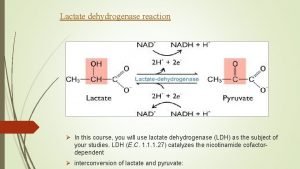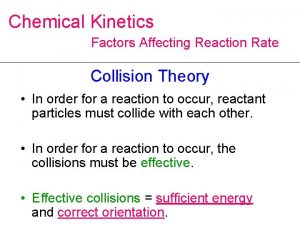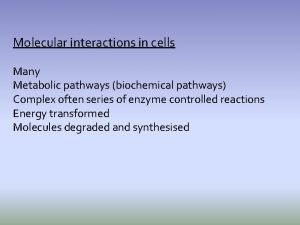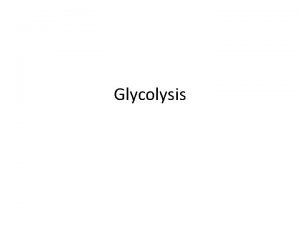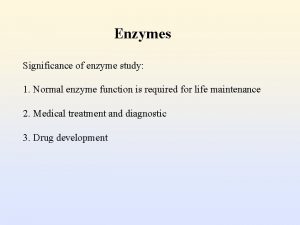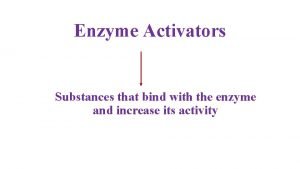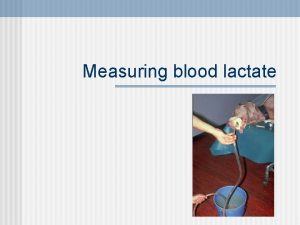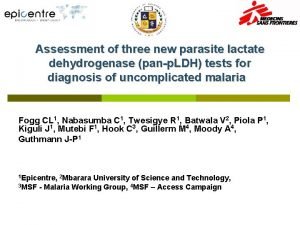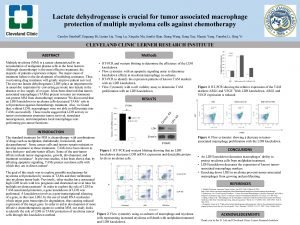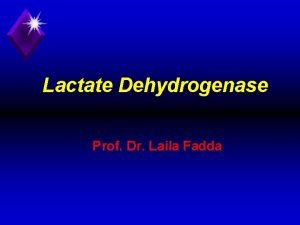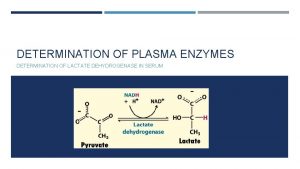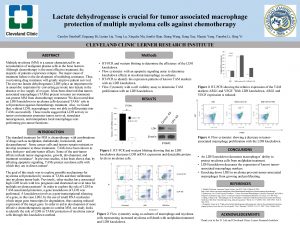Lactate dehydrogenase reaction Factors that Affect Enzymatic Analysis










- Slides: 10

Lactate dehydrogenase reaction

Factors that Affect Enzymatic Analysis:

Enzyme activity is measured in vitro under conditions that often do not closely resemble those in vivo. The objective of measuring enzyme activity is normally to determine the amount of enzyme present under defined conditions, so that activity can be compared between one sample and another, and between one laboratory and another. The factors that affect the activity of an enzyme include substrate concentrations(s), p. H, inhibitors and temperature.

Reagent For liver & kidney LDH 0. 1 M Tris, p. H 7. 4, 1. 5 m. M sodium pyruvate - dilution range 0. 05 to 0. 5 m. M NADH (prepared fresh) Enzyme extract For muscle LDH, 0. 1 M Tris, p. H 7. 4 0. 1 M lactate stock solution - dilution range 5 to 13 m. M 5 m. M NAD+ (Prepared fresh) Enzyme extract

The effect of p. H on enzyme activity: 1 - Enzymes are active only within a limited range of PH e. g. p. H 5 to 10 2 - The optimum PH which is the maximum activity is attained. 3 - Six different PH buffers ranged from 4 to 9 have been used: PH 4, and 5 were Acetate buffers PH 6, and 7 were potassium phosphate buffers PH 8, and 9 Tris buffer for preparation see appendix).

Bell-Shaped curve


Method B 4 B 5 B 6 B 7 B 8 B 10 In each 2. 7 ml of buffer 0. 1 ml substrate 0. 1 ml of NADH T 4 T 5 T 6 T 7 T 8 T 10 Read the absorbance at 340 nm

The effect of Temperature on enzyme activity: Temperature affects enzyme activity in much the same way as it affects other chemical reactions. Thus it is important when carrying out an enzyme assay to ensure that the temperature remains constant, and also that you know exactly what it is. Enzyme activity has been studied at different temperature 20, 30, 40, 50, 60 and 70 °C.

Method B 20 B 30 B 40 B 50 B 60 B 70 In each 2. 7 ml of buffer 0. 1 ml substrate 0. 1 ml of NADH T 20 T 30 T 40 T 50 T 60 T 70 Read the absorbance at 340 nm
 Lactate dehydrogenase
Lactate dehydrogenase Factors that affect reaction time
Factors that affect reaction time Factors that affect reaction time
Factors that affect reaction time Succinly
Succinly Succinate dehydrogenase inhibitor malonate
Succinate dehydrogenase inhibitor malonate Pyruvate dehydrogenase
Pyruvate dehydrogenase Succinate dehydrogenase inhibitor malonate
Succinate dehydrogenase inhibitor malonate Succinate dehydrogenase inhibitor malonate
Succinate dehydrogenase inhibitor malonate Enzyme activators and inhibitors
Enzyme activators and inhibitors Pyruvate dehydrogenase
Pyruvate dehydrogenase Pyruvate dehydrogenase mechanism
Pyruvate dehydrogenase mechanism
